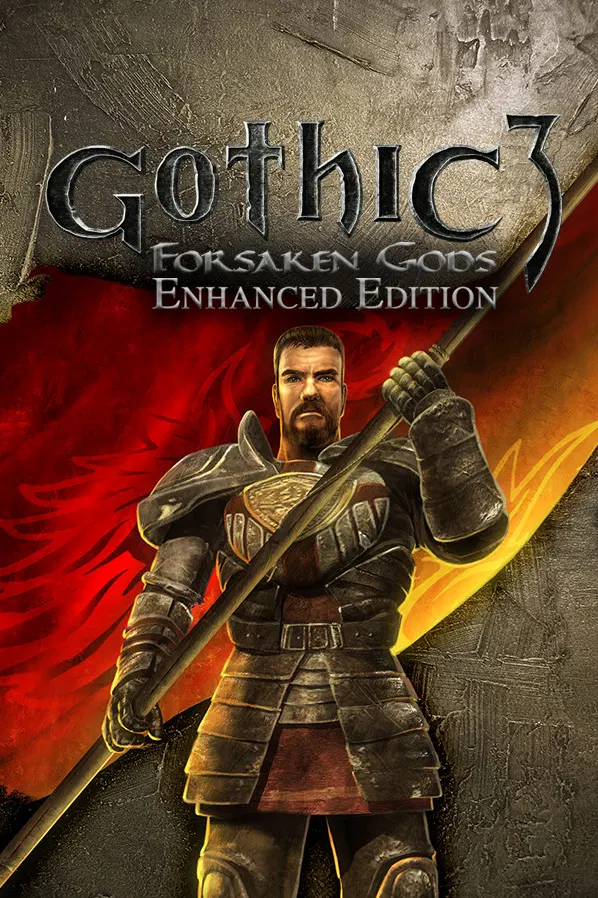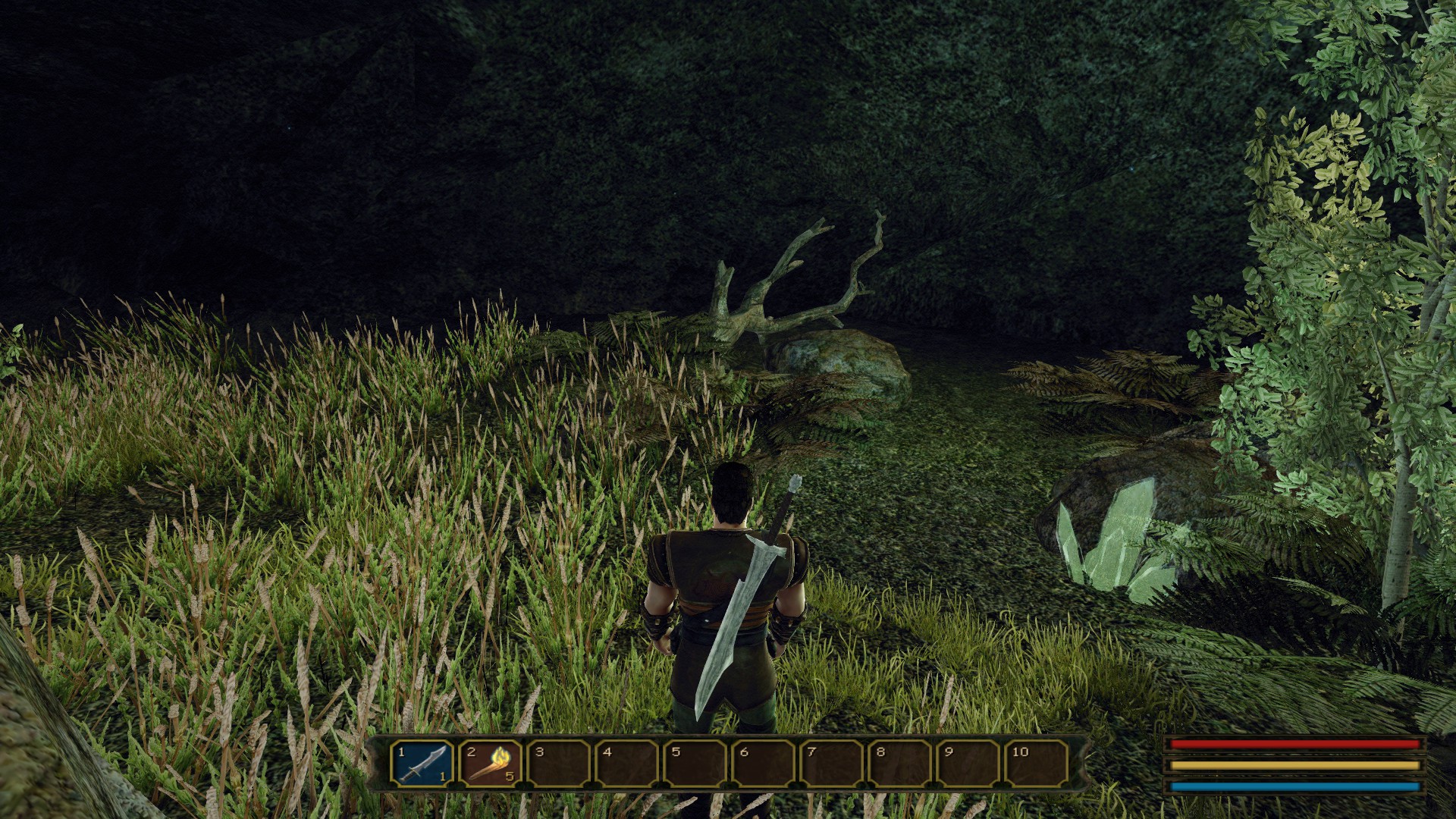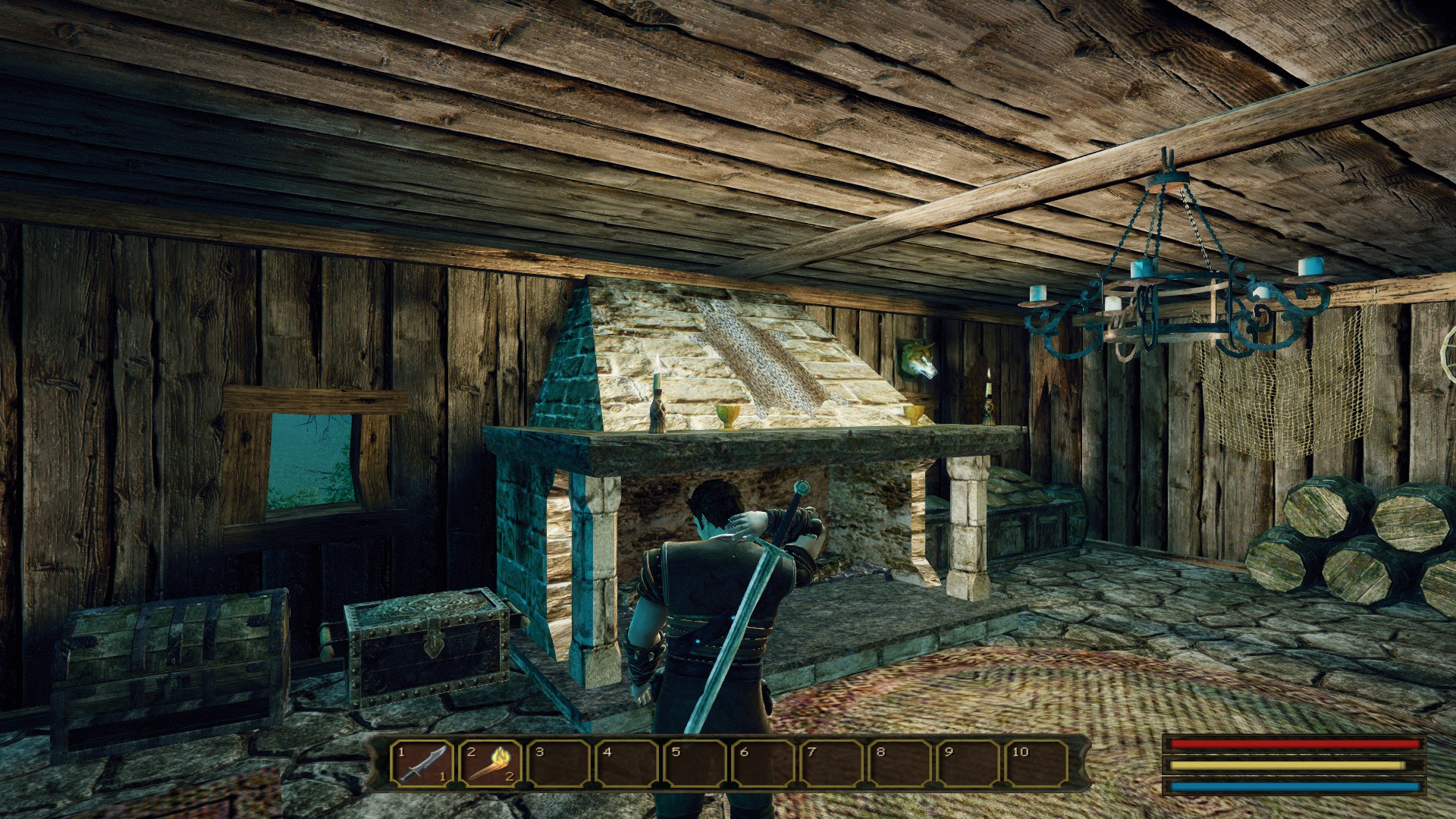Search
[{{{type}}}] {{{reason}}}
{{/data.error.root_cause}}{{{_source.title}}} {{#_source.showPrice}} {{{_source.displayPrice}}} {{/_source.showPrice}}
{{#_source.showLink}} {{/_source.showLink}} {{#_source.showDate}}{{{_source.displayDate}}}
{{/_source.showDate}}{{{_source.description}}}
{{#_source.additionalInfo}}{{#_source.additionalFields}} {{#title}} {{{label}}}: {{{title}}} {{/title}} {{/_source.additionalFields}}
{{/_source.additionalInfo}}- Details
- Category: Computer
- By Daniel Cullen
- Hits: 635
Gothic 3: Forsaken Gods Enhanced Edition (PC)

Gothic 3: Forsaken Gods Enhanced Editioname Title
Developed By: Trine Studios, G3 Community Patch Team, Mad Vulture Games
Published By: THQ Nordic
Released: March 22, 2011
Available On: Microsoft Windows
Genre: Action RPG
ESRB Rating: Teen
Number of Players: Singleplayer
Price: $9.99
(Humble Store Link)
Note: The review covers the 2011 Steam re-release of this game. To see the original 2008 release (which is no longer sold or supported), please refer to the review written on that version for the differences. Also, according to the original developers Piranhna Bytes, this game nor the Arcania games after are canon, as the mentioned games were developed without their input. The series is being rebooted with a Gothic remake in development at the time of this writing, so this will be written from the viewpoint of it's canon to the pre-reboot games.
Some games begin with a great concept yet make every foolish mistake and wind up a disaster. Noble attempts are made to salvage the disaster to make something good out of the conceptual foundation. Gothic 3: Forsaken Gods Enhanced Edition is a valiant effort in this regard, though it struggles mightily against a lot of things beyond its power to fix.
Gothic 3: Forsaken Gods had a troubled production history. After the somewhat flawed but still conceptually sound Gothic 3, the devs (not the original developers, the publisher Jowood which temporarily acquired the rights after) wanted to make a standalone expansion as a bridge to further games but did not have the time to do so themselves. For some reason, they handed the IP over to a studio that never touched any of the prior games and gave them around a year or so to make an expansion basically from scratch. The result was effectively a bad hack of Gothic 3 with bugs out of the wazoo, a world that was lazily cut and pasted from existing assets for a notional expansion/sequel, and all of its new elements were just terribly done, feeling more like a poor fan mod than a game that should have received professional polish.
Fans valiantly did their noble best a few years after to patch the engine to be reasonably stable and fix as many series continuity errors and poor world design decisions as they could. However, despite trying to fix as much of the game as possible, they could not do much at all to fix the weak story, poor new voice acting, and many other aspects of the concept that dragged it down regardless. The Enhanced Edition is thus a functional game, but far from a truly fun one.
The basic story of Forsaken Gods follows up on a rather hazily defined followup to Gothic 3, not truly specifying which of its multiple endings is canon, apparently borrowing elements of all of those endings (with the Xardas ending being the default base with parts of the others). In short, despite your best attempts to unite the shattered world of Gothic 3, it has all fallen apart and you must start from square one to get it done right this time.

Strong Points: Far better on a technical level than the bug-riddled original version
Weak Points: Weak plot with poor world logic and structure; terrible new voice-acting; easily skippable despite its canon status due to abysmal quality; semi-frequent loading hitches
Moral Warnings: Action RPG violence (with the possibility to murder non violent characters at your discretion); Some mild language (d*mn a few times and a rare b**t**d here and there); references to out-of-wedlock sex and cuckoldry; Some occult/undead style enemies and possibility of summoning ally demonic beings; rather broken ethical system that requires a lot of questionably moral at best options to complete many game quests; references to alcohol, smoking, and drug usage
It's with this premise you are dropped feet first into an open-world, low-fantasy RPG. The low-fantasy part refers to the fact the supernatural, while present, is given far less prominence than the mundane elements, so while spells and monsters exist, they are not the focus of the story. The rest of the experience is familiar to anyone who has played an open-world RPG. You are given broad freedom to go nigh anywhere to do quests, explore dungeons, talk to people, and do whatever you like until you reach the end.
That said, while this is built on the engine of Gothic 3 (with many backported improvements from the fan-based and developer-sanctioned Enhanced Edition versions of that title), it does feature a few changes. The Stamina system merely limited sprinting in Gothic 3 and is now made a bit more important to combat, as you cannot fight as effectively or quickly with low or no stamina. The combat AI and balance have been massively reworked to have more challenge, and while this may put off those who liked how easy the original game was, it does make this seem properly challenging as opposed to effortlessly easy. The open world has been reduced to just the core Myrtana area, with the Varant desert and the frozen north Nordmar areas from Gothic 3 sealed off from the player. Many areas remain the same in appearance from Gothic 3, barring some rearranged setpieces, though some areas formerly hard to enter in the last game are now open and some others are closed off initially. Unlike the original edition, some artifacts of Gothic 3 and some of the much more poorly implemented set pieces have been fixed in the Enhanced Edition for reasons of game logic and world optimization.
That all said, it must be stated the Enhanced Edition, while making the engine and world reasonably stable and functional, cannot fix many things. The voice acting not cribbed from Gothic 3 is laughably bad. The story and gameplay loop is far more boring than Gothic 3 at its worst, with quests lacking coherency with the plot and the plot itself being soup-thin.
The graphics, typically of the Gothic series, are very muted in tone, presenting a good-looking if grim-looking fantasy world with a lot of dark tones. On max settings, this game can look pretty beautiful, but the game engine can hiccup during loading at times if you have the draw distance set extremely high. Animations are quite good if a bit stiff at times, and the 3d models are decent, though there are some issues with clipping in a few places.
The music and sounds are all ported from Gothic 3 with hardly any new additions, though still just as pleasant to hear. The musical score, appropriately enough, has a gothic tone and there are lots of ambient tracks to fit various locations. The voice acting carried over from Gothic 3 is fine, but a lot of the new voice acting ranges from acceptable at best to laughably bad. The Nameless Hero (your character) had his VA replaced with a rather loud, whiny-sounding guy as opposed to the chill, collected VA he had in 3. Him aside, the returning VAs are still decent.
The game can be controlled by a keyboard and mouse. It's not really designed to work with any sort of gamepad, though the game does provide basic instructions on the keyboard and mouse controls.

Higher is better
(10/10 is perfect)
Game Score - 64%
Gameplay - 10/20
Graphics - 7/10
Sound - 6/10
Stability - 4/5
Controls - 5/5
Morality Score - 58%
Violence - 5/10
Language - 7/10
Sexual Content - 6/10
Occult/Supernatural - 5/10
Cultural/Moral/Ethical - 6/10
Unlike the crash-prone, bug-riddled mess that was the original version, the engine is quite stable and functional. It still has hiccups in loading areas here and there, but that's about the worst of it. Settings can be easily maxed out by many high-end PCs, but given the engine is still not very optimized, the player may wish to tone down some eye candy to minimize load hiccups. Finally, Gothic 3 is Playable on Steam Deck, but this game is unsupported and has many issues even staying stable using any version of Wine on Linux in general.
Morally, there are some issues.
Violence is fairly tame despite the fact you can use magic or weapons to take down enemies. Bodies do not disappear after death immediately (they will after some time though), but this is without gore or blood. You can assault and kill in legitimate self-defense or murder, at your discretion, with it only being able to murder non-violent NPCs by deliberate intent.
Language is fairly mild. A fair amount of d*mns and the rare b**t**d, but that's about it. There are a few references to cuckoldry and sex outside of marriage though, though they don't portray this as a good thing. Sexuality and nudity are essentially absent.
The game world is a low-fantasy world with a mildly polytheistic religion with a god of light, a god of darkness, and a god of balance. The in-game morality centers very little around them, though the god of darkness does have demonic servants summonable as spells usable by the player. Enemies include demons and undead.
The basic concept is to reunite a shattered land into a unified whole by gaining the trust and support of the various factions and resolving a burgeoning civil war. How you get there will involve some fairly gray morality at times and some quests require defying laws, theft, and even murder and assault if you want all rewards. You are given the option to reject some quests or simply elect not to complete them. Booze is a common item for consumption and there are hookah-style pipes and in-universe cigarettes called Black Rhobars. The orcs you meet do call humans "Morras" often, but this has a neutral meaning, merely their way of saying "human", though they do use "human" on occasion.
See the following for some technical notes on how the in-game morality system has some issues:
Murder is wrong and punished in this game, but the theft system is pretty broken on a technical level. Normally, based on the rules from Gothic 3, if it's not in a building owned by someone else (all inside town or castle areas are considered owned), a quest item you need to gather that does not need to be explicitly stolen, or a natural item like a gatherable plant, it's legal to take. Forsaken God's implementation is pretty spotty in places, with the effective rule boiling down to "it's fine to take if no one sees you most of the time". This system is so broken that all you need to do is hit anyone who does see until they are knocked out and they wake up having forgotten about it.
Overall, despite the valiant strides that make this mostly playable on technical grounds, Gothic 3: Forsaken Gods Enhanced Edition is still not a game I can recommend. It's canon to the games that come after, but you could easily skip it and not lose much. Morally, it's got a lot of sketchy content that may be disturbing and uncomfortable if they are not an adult. In short, if you need an open-world RPG to play, this should be at the bottom of the list of alternatives.




